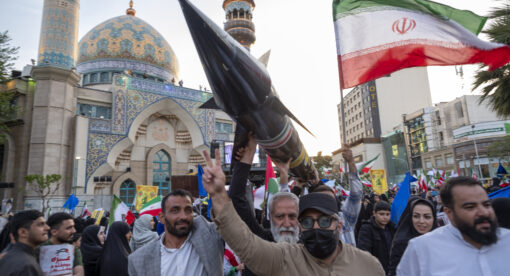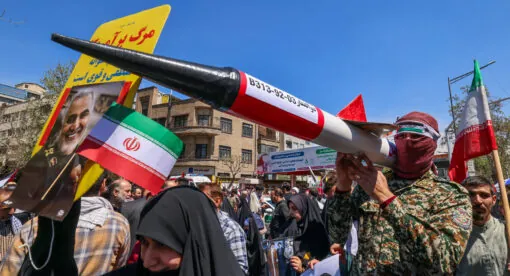Jordan’s recent decision to change its approach to its northern neighbor likely stems from the kingdom’s economic and security concerns about the Syrian civil war.
As it became clear that President Bashar al-Assad would not be ousted amid the Syrian civil war, the Hashemite Kingdom of Jordan was forced to reconsider its relationship with its northern neighbor. Thawing ties between the two countries could provide an opportunity for the United States, via its own strengthening relations with Jordan, to have indirect influence in the future of the region.
A Fragile Economy
One interest that Jordan has in adopting its current stance toward Syria is economic. The kingdom’s fragile economy remains a threat to its stability. The influx of refugees from war zones, particularly from Syria – there are nearly 1.4 million Syrian refugees in the country, who cost the kingdom over $2.5 billion per year – further impacted Jordan’s economy. In 2016, King Abdullah II said the impact of Syrian refugees drove Jordanians to a “boiling point.” Meanwhile, the economy is increasingly struggling, especially with the implications of COVID-19. While the youth unemployment rate is said to be around 50 percent, the public debt reached 85 percent of GDP last year.
Jordan is believed to have sought an exemption to U.S. Caesar Act sanctions, which have hurt the country’s already weak economy, to allow it to resume normal trade with Syria. It sees increased economic ties with Syria as a way to bolster both its own economy and Syria’s, seemingly hoping that a more stable Syrian economy would lead to a more stable security situation, both domestically and regionally.
To that end, on Sept. 8 Amman hosted a meeting attended by the Egyptian, Lebanese, and Syrian energy ministers, the first to include a senior Syrian official since the crisis broke out. The ministers agreed that Egypt would deliver gas to Lebanon via Jordan and Syria and that Syria would deliver electricity from Jordan to Lebanon. And in late September, Jordan and Syria agreed to reactivate a 1987 agreement binding Syria to provide the kingdom with roughly 200 million cubic meters of water a year from the Yarmouk River.
Jordan appears to have at least three other economic interests in pursuing its current stance. First, if a political solution is reached, Jordanian companies would seek to play a role in reconstructing Syria, which would benefit the kingdom’s economy. Second, Syria may soon be invited to join the emerging Jordan-Egypt-Iraq alliance. The alliance’s main objective is economic cooperation, especially consistent economic support. If Syria joins the bloc, that is likely to have positive economic implications on all four states. Also, it is hoped that the reopening of the Jaber-Nassib border crossing between Jordan and Syria on Sept. 29 would “move the wheel of the economy” for Jordan, increasing trade and tourism in the Kingdom.
External Threats
Jordan faces several external threats because of the Syrian civil war. While the security agencies in both Jordan and Syria continued to cooperate with each other even when bilateral relations worsened after the war broke out, an improvement in those ties would increase the effectiveness of such cooperation.
One of these external threats remains terrorism, especially from the Islamic State group, as evidenced by a thwarted plot against the Jordanian Intelligence Department’s headquarters in the city of Irbid in March. On Sept. 19, Syrian Defense Minister Ali Ayyoub conducted a rare visit to Amman , believed to be the first of its kind since the conflict broke out. During his visit, Ayyoub met with Yousef Huneiti, the Chairman of the Joint Chiefs of Staff of the Jordanian Armed Forces, with the aim of “ensuring the safety of the joint borders between the two countries, the situation in south Syria, fighting terror and working together to stem drug smuggling,” according to Jordan’s state-run news agency.
Ayyaoub’s visit came shortly after Jordan decided to postpone the reopening of Jaber-Nassib border crossing between the two countries due to the Syrian government’s offensive in Daraa governorate. The kingdom has been concerned about both the clashes and the presence of Iranian militias near its borders. Jordan places great value in keeping such militias far from its territories. Moscow pledged in 2018 to keep these forces far from the Jordanian and Israeli borders, but this guarantee has gone demonstrably unfulfilled, and Amman still wants Moscow to make good on its promise. According to Osama al-Sharif, a veteran Jordanian journalist and political commentator, the monarch “asked for Russian commitments to keeping these militias at least 30 km from the Jordanian borders” in his recent visit to Russia. Indeed, with the border crossing now reopened, it remains to be seen whether Russia will push these fighters far from the kingdom’s borders.
In a broader sense, it can be argued that one goal of Jordan’s re-engagement with Assad is distancing Syria from Iran. Jordan’s attempt to minimize Iran’s influence is not limited to Syria but extends to the entire region. This is why, during his July visit to the U.S., King Abdullah urged President Joe Biden to support Iraqi Prime Minister Mustafa al-Kadhimi in distancing Iraq from Iran. Abdullah has reportedly said al-Kadhimi can help keep Iraq-based Iranian fighters under control. While the Jordan-Egypt-Iraq alliance has economic motives, it also has a political objective of minimizing Tehran’s leverage in Iraq.
Jordan also wants to put an end to cross-border drug smuggling. Jordan has served as a transit country for Captagon, given its land route and proximity to destination markets in the region, and one of its hopes for increased cooperation with Syria is addressing smuggling from the north.
Ties with Washington
Biden’s election provided Jordan with an opportunity to step up its diplomatic endeavors in the Middle East. The main aspects of the decades-long ties between Jordan and the U.S. remained the same during Donald Trump’s presidency, but while Trump seems to have provided unconditional support to countries such as Saudi Arabia, Jordan appears to have felt it was sidelined from its regional role.
The main point of disagreement between Amman and the Trump administration was the latter’s approach to the Israeli-Palestinian conflict. Trump took steps that officials in Amman did not agree with, such as moving the U.S. embassy to Jerusalem and recognizing the city as the capital of Israel. In early 2020, Trump unveiled his peace plan for the Middle East – a plan that had no mention of Jordan’s historic role as the custodian of the Islamic and Christian holy sites in Jerusalem, which is considered a source of the monarchy’s legitimacy. If the plan had been implemented, it would have further distanced the Israeli-Palestinian conflict from the two-state solution.
Jordan’s current Syria approach also comes as part of managing its relations with Washington. While Gulf Corporation Council states interested in restoring their ties with Assad seem to be waiting for Washington’s approval, the U.S. appears to have granted the kingdom political cover to pursue its current approach. The Biden administration has begun to rely on Jordan regarding some regional security issues; for instance, a few months ago, the U.S. shifted army basing from Qatar to Jordan. The Syrian conflict can be seen in the same context, especially given other regional states’ obstacles in their ties with Washington.
Yet while Amman and Washington seem to agree on finding a settlement for the conflict, one main challenge lies in getting Assad to make any significant political concessions. “The problem is that the Assad government is really in no danger of falling in the near term despite the catastrophic conditions in Syria. Authoritarian government’s extractive capacities regarding means and ways to survive are usually extensive,” said David Lesch, professor of Middle East History at Trinity University in Texas, whose most recent book is “Syria: A Modern History.” “As such, as it has done in the past in a typical Syrian government tactic, Damascus might just choose to continue to wait it out without making political concessions that it sees as nothing more than a backdoor attempt to try to remove Assad from power.”
Indeed, Assad seems to have been gradually getting out from his isolation over the past few years, with countries such as the United Arab Emirates recently restoring previously severed relations. Thus, while convincing Assad to make concessions is not an easy task, Jordan is likely to continue communicating with various parties, including the U.S., regarding moving the peace process forward. For Washington, a political solution in Syria would achieve a semi-permanent management system in Syria that allows the U.S. to pull out its troops but also empowers Assad in the country, which would go against America’s human rights agenda. For Jordan, some of its regional concerns would be alleviated.
Abdulaziz Kilani is a British-Arab writer who focuses on the Middle East and North Africa. Kilani’s work has been published in Arabic-language media outlets such as Alrai newspaper (Jordan), Ammon News (Jordan), Al Jazirah newspaper (Saudi Arabia), Alanbaa Alsiyasia newspaper (Morocco), Donia Al-Watan (Palestine). He has also published in The American Conservative, Responsible Statecraft, Lobelog, Middle East Monitor, Lobelog, TRT World, The Globe Post and Inside Arabia. He tweets as @AZ_Kilani.
The views expressed in this article are those of the author and not an official policy or position of the New Lines Institute.







